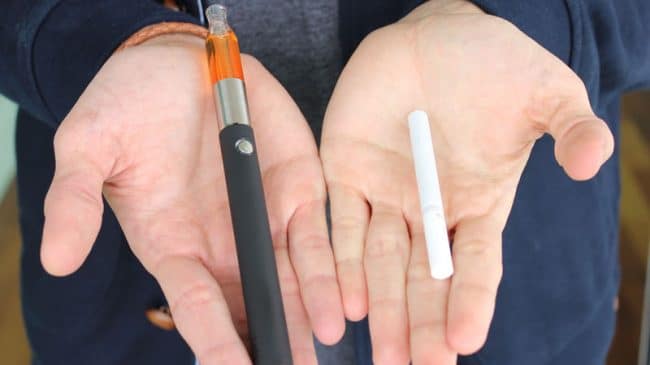Federal News Round-Up
Stop the Vape Ban and Consumer Advocates for Smoke-Free Alternatives Association (CASAA) are encouraging consumers to file comments with the FDA in support of a Citizen Petition filed by NJOY, Smoke-Free Alternatives Trade Association (SFATA), Vapor Technology Association (VTA) and other vapor manufacturers. The petition requests that FDA issue “final guidance” in regard to FDA applications under the deeming regulations and that deadlines be extended until two years after such guidance has been issued.
Iowa Attorney General Tom Miller and a group of harm reduction experts published a letter to FDA Commissioner Scott Gottlieb arguing that federal policy regarding lower risk nicotine products such as e-cigarettes should be proportionate and non-discriminatory. It highlights, in particular, the potential advantages of a standards-based approach.
Clive Bates, one of the co-signatories of the letter to Dr. Gottlieb, published a discussion paper on Rethinking nicotine: implications for U.S. federal tobacco policy, which elaborates on several points made in the letter. In particular, Bates emphasizes the role of standards as a means of protecting consumers by ensuring that lower risk products are of high quality while creating greater legal certainty for producers, thereby establishing a framework in which innovation is stimulated rather than suppressed.
State News Round-Up
18 state legislatures (and the District of Columbia, Guam, Puerto Rico and U.S. Virgin Islands) are meeting actively this week.
California (local) flavor bans are being pursued in San Francisco, Oakland, San Leandro, Los Gatos, Palo Alto and Contra Costa County. San Leandro held a hearing on the proposed flavor ban and declined to act. The council sent the bill back to the Rules Committee for consideration in September.
The California Senate passed legislation that prohibits delivery of alcohol or tobacco products on a college or university and requires companies to meet new standards for delivery elsewhere.
New Jersey’s Assembly Appropriations Committee approved by a 7-2 vote legislation that would increase the age of purchase for tobacco products (and vapor products) from 19 to 21. The bill is now eligible for the consideration of the New Jersey Assembly.
The New Jersey Assembly’s Health and Senior Services Committee approved legislation that would require vapor product manufacturers, distributors, and retailers to obtain a state license by an 11-1 vote. The bill is now eligible for floor action in the Assembly.
New York’s Assembly Codes Committee passed by an 18-4 vote legislation that prohibits the use of e-cigarettes on school grounds. The bill was referred to the Assembly Rules Committee.
Rhode Island’s House Finance Committee held a hearing on legislation that would raise the age of purchase for tobacco products and vapor products from 18 to 21. The Committee recommended that the bill is held over for further study.
Rhode Island House approved legislation that defines vapor retailers as “retail tobacco stores” requiring a license and defines the use of vapor products as “smoking” and was sent to the Senate for consideration.
Science and Harm Reduction
A new paper published in the July 2017 issue of Preventive Medicine investigates associations between the use of e-cigarettes among young adults and non-daily cigarette smoking. As with several similar previous studies, the analysis begs but does not adequately answer questions of causation.
Data released Thursday by the Centers for Disease Control and Prevention shows the prevalence of smoking among high school students halved in the five years from 2011 to 2016. Over this same period, there was a marked increase in youth experimentation with e-cigarettes.
Youth use of e-cigarettes also dropped from 16 percent in 2015 to 11.3 percent in 2016 and high school students use of cigarettes dropped in the same year from 9.3 percent to eight percent. Dr. Michael Siegel argues the data should “put to rest the contention that electronic cigarettes are a gateway to smoking among youth.”
Regulation
Senator Ron Johnson petitioned the head of the Food and Drug Administration Scott Gottlieb to reconsider regulations that threaten to destroy the bulk of the industry and restrict adult access to reduced risk products. “As you begin your tenure as commissioner of the FDA, I respectfully urge you to review the FDA’s e-cigarette regulation so that the industry can continue to innovate and offer vapors [as] an alternative to smoking,” writes Johnson.
Taxation
Kansas Joint Conference Committee approved a conference committee report that would delay implementation of a vapor tax until July 1, 2017, and reduce the scheduled tax from $0.20 to $0.05 per ml of e-liquid. The language was sent to the Governor for consideration.
Nevada legislation that would have modified the excise tax on vapor products from 30 percent of the wholesale price to $0.05 per ml of liquid died in the Assembly.
What’s Coming Up?
Global Forum on Nicotine will be hosting its annual meeting “Reducing Harm, Saving Lives” in Warsaw, Poland on June 15-17, 2017.
The American Enterprise Institute is hosting a panel discussion on sensible regulation for e-cigarettes and opportunities for reform on June 29.
The Independent Women’s Forum is hosting an event in Washington DC June 29 on how public health guidance often harms the American Public.
Quotable Quotes
“Creating new laws around the country and making criminals out of millions of disproportionately lower income and less educated young adults who simply make a personal choice some don’t like is short sighted. And asking the police to selectively enforce it is reckless and irresponsible,” – Brian Fojtik, Senior Fellow with the Reason Foundation.
Additional Resources
The Proposed Tobacco Product Standard for NNN Level in Smokeless Tobacco Should Be Withdrawn
The World Health Organization’s Opposition to Tobacco Harm Reduction: A Threat to Public Health?
The Vapor Revolution: How Bottom-Up Innovation Is Saving Lives
Reason’s Research and Analysis of Nicotine and Vapor Issues

